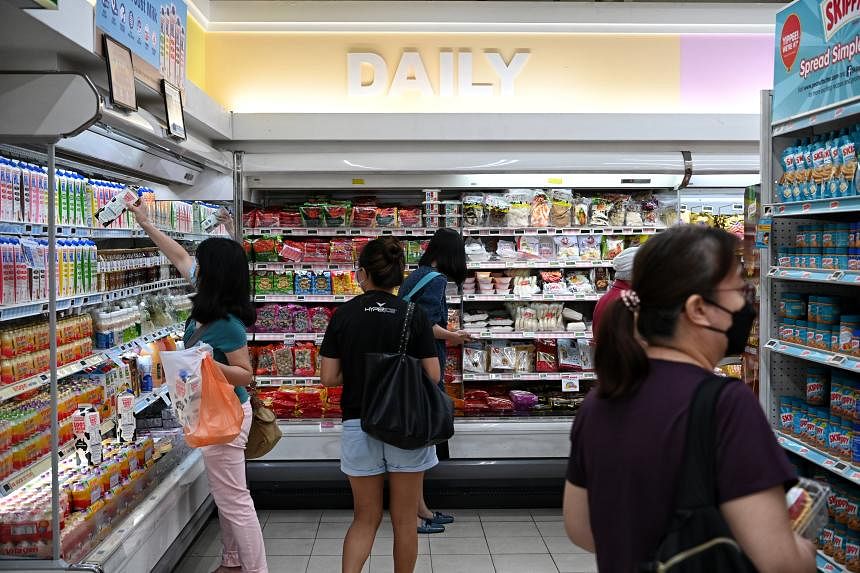SINGAPORE - Singapore is headed for a difficult year in which economic growth will slow while inflation will remain high, partly because wage increases are expected to continue.
Global prices may come off their recent peaks but inflation here will remain higher in 2023 than the historical average, said the Monetary Authority of Singapore (MAS) on Thursday in its biannual macroeconomic review.
Meanwhile, the pace of economic growth will slow further in 2023 as pent-up demand from the economic reopening dissipates at home and external demand for Singapore’s key electronics exports fades.
While Singapore does not face an imminent threat of a recession, it could be hit if economies such as the US and the European Union enter a prolonged downturn.
For now, the MAS’ base-case scenario is that the US will avoid a full-year recession, in which case gross domestic product (GDP) growth in Singapore is likely to come in at 3 per cent to 4 per cent for 2022 as a whole, and moderate in 2023 to a below-trend pace – estimated by analysts at around 3 per cent.
Meanwhile, weakening external demand has brought the global electronics cycle to the brink of a downturn. The electronics segment represents the bulk of Singapore’s export-driven manufacturing sector.
MAS said consumer demand for electronic devices in Singapore’s top two final-demand markets, China and the US, has contracted, hitting Singapore’s electronics exports in recent months. Meanwhile, the domestic semiconductor industry is also grappling with soaring energy costs, it added.
Consultancy firm Gartner expects global chip sales to decline by 2.5 per cent in 2023.
As new orders and exports waned, the electronics purchasing managers’ index for Singapore contracted for a second consecutive month, retreating further in September.
MAS said growth prospects in the financial sector have also been dented on account of slowing external demand, arising from heightened global inflation and tighter financial conditions due to interest rate hikes by major central banks.
“While growth in the economy should continue to be supported by expansions in the domestic-oriented and travel-related sectors, the pace of discretionary spending is likely to moderate as high inflation and the uncertain economic environment dampen consumer sentiment.”
A slowing economy will take the vigour out of employment growth. However, with inflation continuing to loom, resident wage growth is expected to remain above pre-Covid-19 rates, which in turn will add to business costs and may reinforce inflation.
“Resident wage growth is forecast to remain above its historical average next year, leading to an above-trend pace of increase in unit labour cost for services firms in particular, even as it slows compared with 2022,” said MAS.
Wages of residents could also be pushed up in 2022 and 2023 on account of progressive wage model expansions and the salary hikes announced to retain workers in the civil service, healthcare and education sectors.
“Notwithstanding the weakening external outlook, hiring should remain firm in most sectors for the rest of 2022,” MAS said.
In the latest fourth-quarter hiring outlook surveys by the Singapore Commercial Credit Bureau and the ManpowerGroup, the net employment outlook remained firmly positive even as it moderated slightly from previous readings.
But moderating global growth and tightening financial conditions will have some impact on labour demand, primarily in the external-oriented manufacturing sector and modern services, which include professional, financial and infocomm services.
The central bank maintained its recent inflation forecasts, saying core inflation, which excludes accommodation and private transport costs, is projected to average around 4 per cent this year, while the all-items headline inflation should come in at about 6 per cent.
For 2023 as a whole, taking into account all factors, including the goods and services tax (GST) hike due next January, core inflation is forecast to average 3.5 per cent to 4.5 per cent. Headline inflation next year is projected to average 5.5 per cent to 6.5 per cent. Excluding the effects of the GST increase, core inflation may come in between 2.5 per cent and 3.5 per cent, while headline inflation may fall in the 4.5 per cent to 5.5 per cent range.
MAS’ assertion that inflation will remain above trend comes from the fact that core inflation in the decade before the pandemic hit in 2020 averaged 1.5 per cent.
The report follows the central bank’s decision on Oct 14 to reinforce the appreciation bias of the Singapore dollar, which helps tamp down import costs. This was the fifth such move by MAS since October 2021. But inflation remains at its highest level in 14 years.


